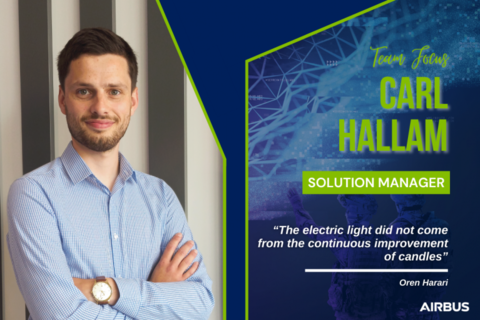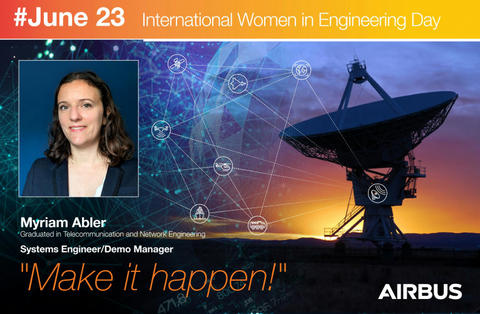World Maritime Day

As we observe World Maritime Day, we have the privilege of speaking with Nick Fuller (FRAeS), Business Development Manager within Airbus and former Officer in the Royal Navy. Hear from Nick as he shares his transition from military service to a career in Airbus working on cutting edge satellite communication programs.
What were you doing before you joined Airbus?
I was an Officer in the Royal Navy, specifically in the Fleet Air Arm where I worked as part of team delivering airborne surveillance to UK and coalition forces. I worked in a variety of environments from deserts to oceans to the coastal regions of Europe.
I joined the Navy in 2010 as a Helicopter Observer and Tactical Mission Controller and attended Britannia Royal Naval College in Dartmouth. I completed my flying grading at Royal Navy Air Station Culdrose on 750 Squadron (trainee observer squadron) and 849 Squadron for OCU Operation Conversion Unit (Sea King Mark 7 Squadron). I received my wings in 2014 and initially joined 857 squadron before moving to 849 squadron where I spent my time flying operationally.
Laterally I worked for Navy Digital directorate within Navy Command HQ and was responsible for developing the Royal Navy’s digital aviation capability, driving the integration of the Peregrine UAS sensor suite directly into the operations room of complex warships. This marked a step change in capability as it will integrate what the UAS is seeing directly into the operations room of warships providing enhanced situational awareness.
What is your biggest takeaway from your time in the Royal Navy?
The culture. There is a culture of strong teamwork and can-do attitude.
My time in the Royal Navy was a really positive experience and definitely helped me grow. It added structure to my professional life and grew my skills as a leader in some very demanding environments. It was a huge privilege to be part of the Fleet Air Arm and a part of the Royal Navy.
What is your greatest achievement during your career in the Royal Navy?
Being presented with my Observer wings and Fleet Air Arm tie.
Flying training is long and arduous, both mentally and physically; there are a great many stages and examinations. There were many challenging times and this really helped build my resilience and determination.
How important was secure connectivity during your time in the Royal Navy?
Secure connectivity was critical. We would use Link 16 (a tactical data link) to share information across coalition platforms. It meant that at the touch of a button, we could tell every other ship, aircraft or HQ where a contact was, what it was doing and whether it was a threat or not. It was limited by the quantity of data you could send, but this is where we now need to get to on a far greater scale.
The right information needs to reach the right person at the right time because as the speed of warfare increases this is going to become mission critical.
How was your experience during deployment?
Our deployments were predominantly four months at a time. We would spend 4-8 weeks land-based and then we would join a ship, normally a Royal Fleet Auxiliary vessel.
I remember being on the quarter deck in the middle of the Atlantic Ocean, nothing in sight and the water was like glass, and watching the most spectacular sunset. I always felt very fortunate to get to experience these moments.
Camaraderie was really important, it helped get you through long deployments. There was a connection between colleagues which fostered a very supportive environment. There wasn’t welfare connectivity at the time which meant calling home was difficult unless you were on land. So my friend and I started a tradition of having a weekly BBQ on the flight line which was a great opportunity for everyone to stop for a short time and just relax and be mates.
What do you do today at Airbus?
I work closely with customers across Europe and the US to develop satcom solutions for military and government organisations. I work with customers to understand what their problems are and figure out how Airbus can solve them by bringing together multiple complex solutions and products.
A large part of my role looks to the future. When we look at the future of connectivity, we now have various constellations to choose from, not just military satellites but also, commercial satellites, Low Earth Orbit (LEO), Medium Earth Orbit (MEO) and ship-to-ship bearers to name a few. At the same time we are seeing a proliferation in platforms and potential network nodes as autonomous systems begin to take a greater role in military operations.
This increased complexity will make it increasingly difficult for operators to ensure they are optimising the use of bearers and connectivity available to them. The work we are doing will have a huge impact in terms of capability and giving operators the greatest possible operational advantage
My role allows me to give back to my colleagues in the Royal Navy; if we can give them a better capability and a better fighting edge against our adversaries then I consider that a job well done.
Do you have any advice for those transitioning from military to industry?
We bring a very unique skill set and certainly don’t conform to some of the military stereotypes you might think of. It is really difficult to translate experience in the military to a civilian role but actually experience gained in the military can bring great benefits to an organisation.
Take for example the world class leadership training you receive, or the real world examples where you have actually had to lead a team and achieve a goal in difficult circumstances. All of these help create a very rounded individual who can adapt and overcome challenge in ways that perhaps civilian counterparts would not consider.
Ultimate military personnel bring lots of transferable skills - don’t doubt yourself.
Your contact

Nick Fuller
Strategic Maritime Business Development


